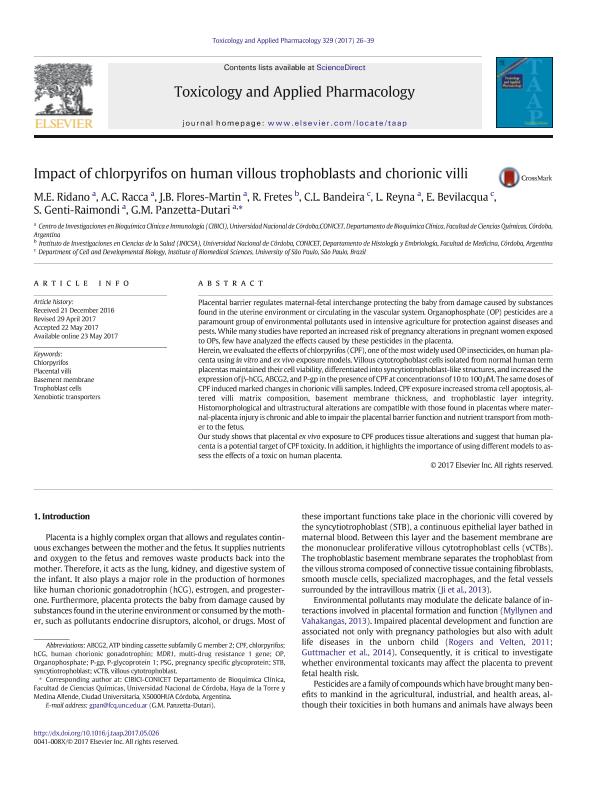Artículo
Impact of chlorpyrifos on human villous trophoblasts and chorionic villi
Ridano, Magali Evelin ; Racca, Ana Cristina
; Racca, Ana Cristina ; Flores Martín, Jésica Belén
; Flores Martín, Jésica Belén ; Fretes, Raquel María; Bandeira, C. L.; Reyna, Luciana
; Fretes, Raquel María; Bandeira, C. L.; Reyna, Luciana ; Bevilacqua, E.; Genti de Raimondi, Susana
; Bevilacqua, E.; Genti de Raimondi, Susana ; Panzetta-Dutari, Graciela Maria del Valle
; Panzetta-Dutari, Graciela Maria del Valle
 ; Racca, Ana Cristina
; Racca, Ana Cristina ; Flores Martín, Jésica Belén
; Flores Martín, Jésica Belén ; Fretes, Raquel María; Bandeira, C. L.; Reyna, Luciana
; Fretes, Raquel María; Bandeira, C. L.; Reyna, Luciana ; Bevilacqua, E.; Genti de Raimondi, Susana
; Bevilacqua, E.; Genti de Raimondi, Susana ; Panzetta-Dutari, Graciela Maria del Valle
; Panzetta-Dutari, Graciela Maria del Valle
Fecha de publicación:
15/08/2017
Editorial:
Academic Press Inc Elsevier Science
Revista:
Toxicology and Applied Pharmacology
ISSN:
0041-008X
Idioma:
Inglés
Tipo de recurso:
Artículo publicado
Clasificación temática:
Resumen
Placental barrier regulates maternal-fetal interchange protecting the baby from damage caused by substances found in the uterine environment or circulating in the vascular system. Organophosphate (OP) pesticides are a paramount group of environmental pollutants used in intensive agriculture for protection against diseases and pests. While many studies have reported an increased risk of pregnancy alterations in pregnant women exposed to OPs, few have analyzed the effects caused by these pesticides in the placenta.Herein, we evaluated the effects of chlorpyrifos (CPF), one of the most widely used OP insecticides, on human placenta using in vitro and ex vivo exposure models. Villous cytotrophoblast cells isolated from normal human term placentas maintained their cell viability, differentiated into syncytiotrophoblast-like structures, and increased the expression of β-hCG, ABCG2, and P-gp in the presence of CPF at concentrations of 10 to 100 μM. The same doses of CPF induced marked changes in chorionic villi samples. Indeed, CPF exposure increased stroma cell apoptosis, altered villi matrix composition, basement membrane thickness, and trophoblastic layer integrity. Histomorphological and ultrastructural alterations are compatible with those found in placentas where maternal placenta injury is chronic and able to impair the placental barrier function and nutrient transport from mother to the fetus. Our study shows that placental ex vivo exposure to CPF produces tissue alterations and suggest that human placenta is a potential target of CPF toxicity. In addition, it highlights the importance of using different models to assess the effects of a toxic on human placenta.
Archivos asociados
Licencia
Identificadores
Colecciones
Articulos(CIBICI)
Articulos de CENTRO DE INV.EN BIOQUI.CLINICA E INMUNOLOGIA
Articulos de CENTRO DE INV.EN BIOQUI.CLINICA E INMUNOLOGIA
Citación
Ridano, Magali Evelin; Racca, Ana Cristina; Flores Martín, Jésica Belén; Fretes, Raquel María; Bandeira, C. L.; et al.; Impact of chlorpyrifos on human villous trophoblasts and chorionic villi; Academic Press Inc Elsevier Science; Toxicology and Applied Pharmacology; 329; 15-8-2017; 26-39
Compartir
Altmétricas



